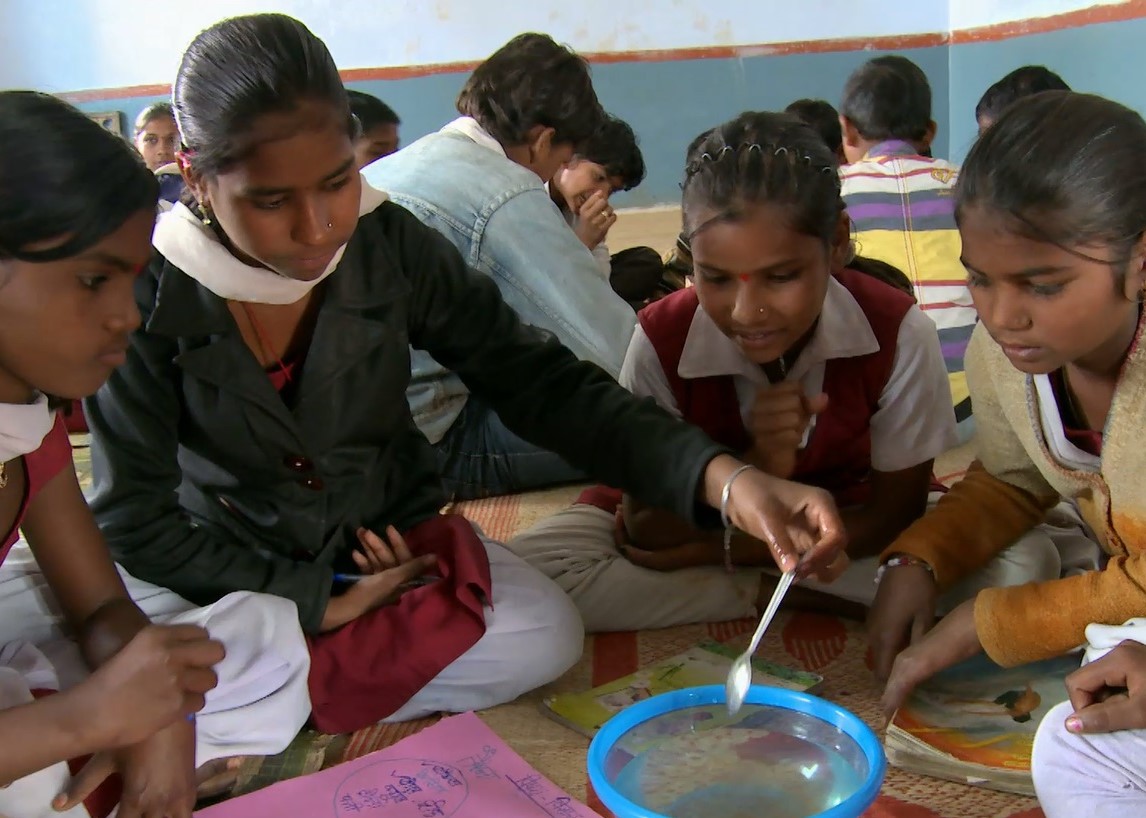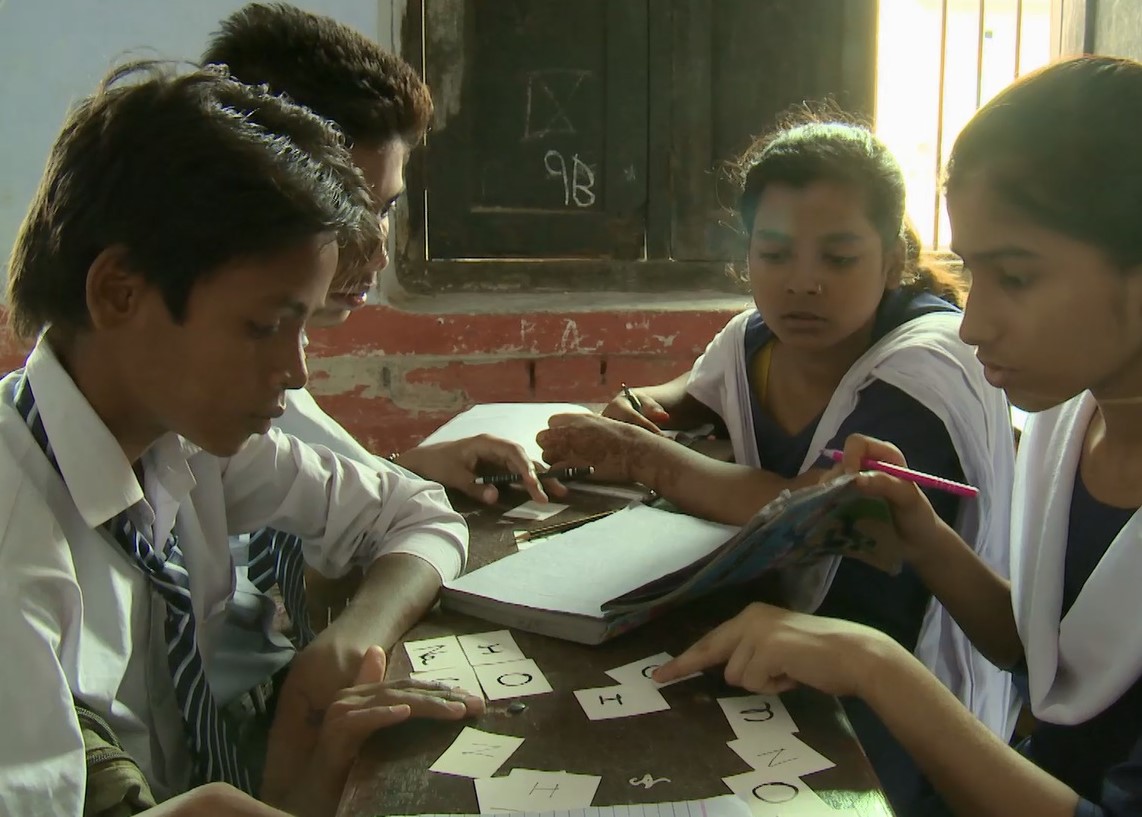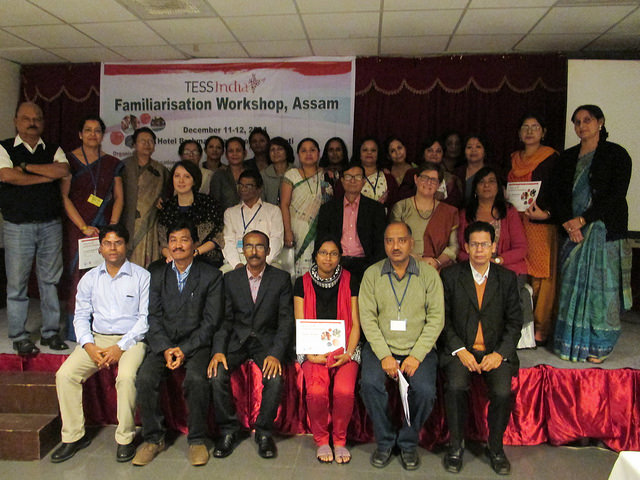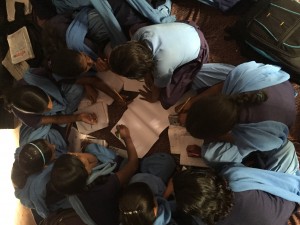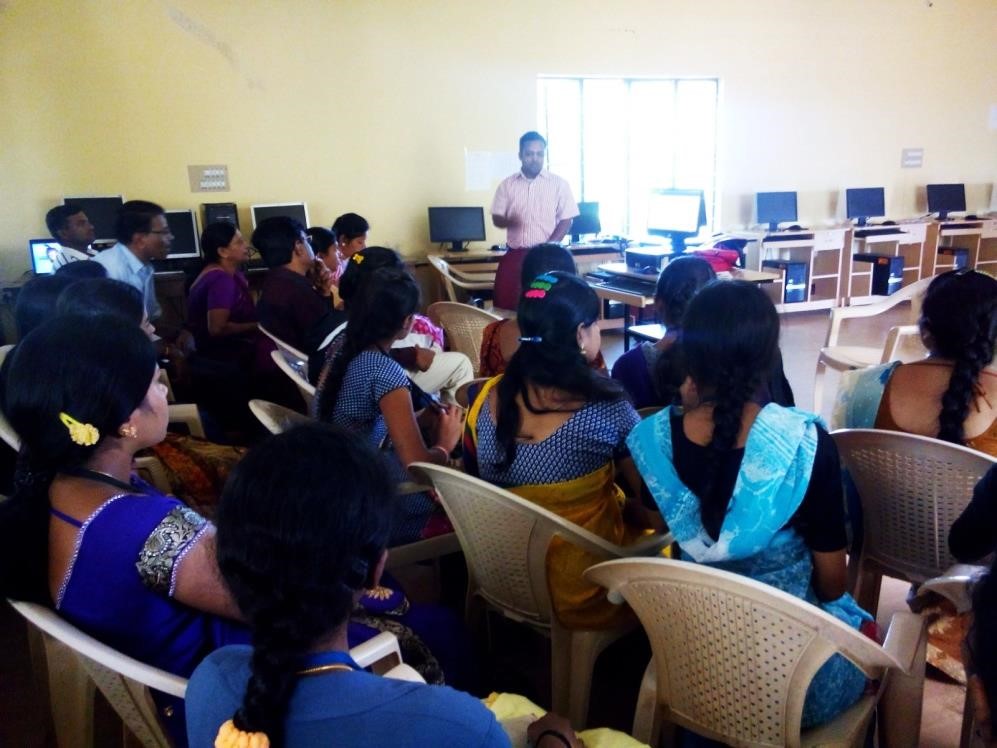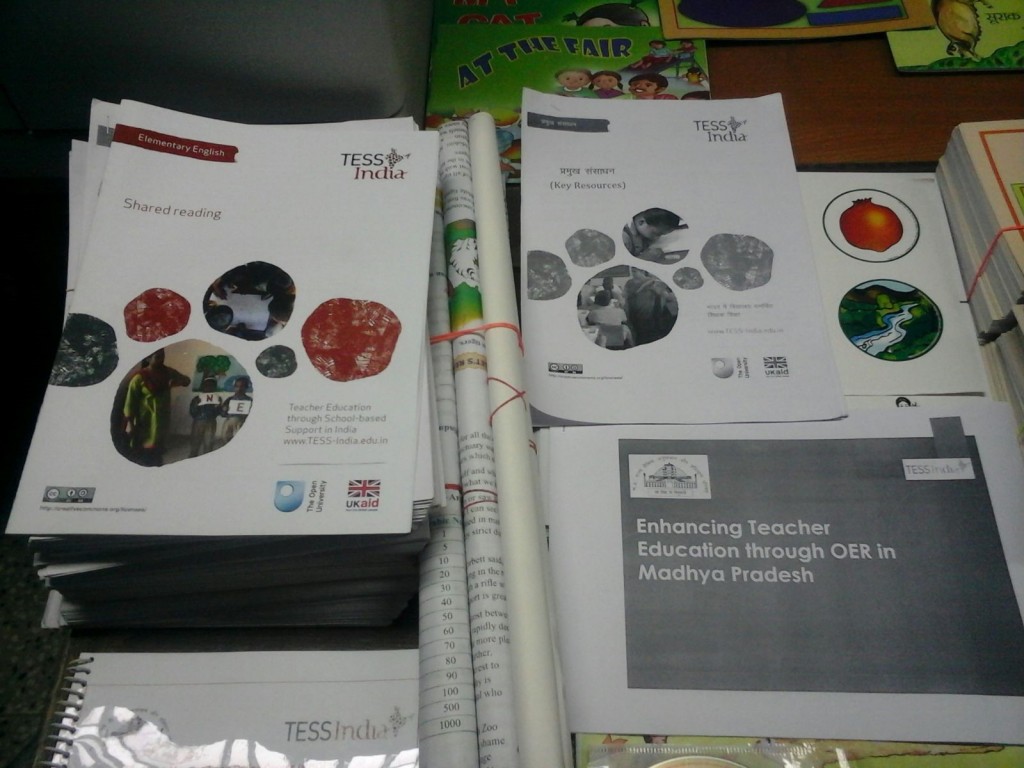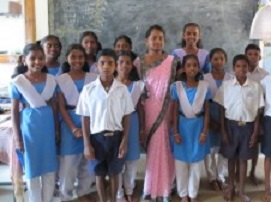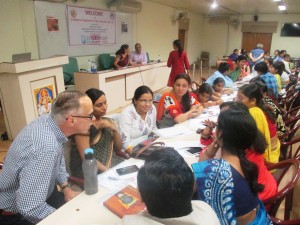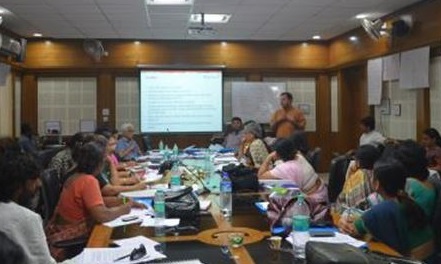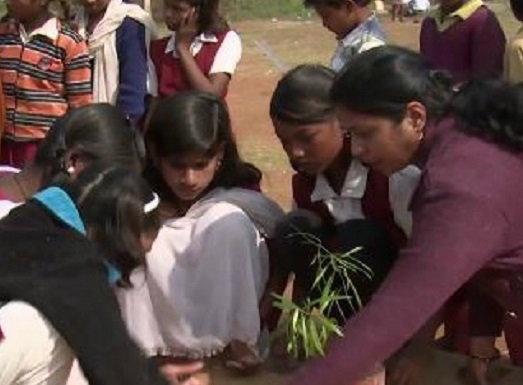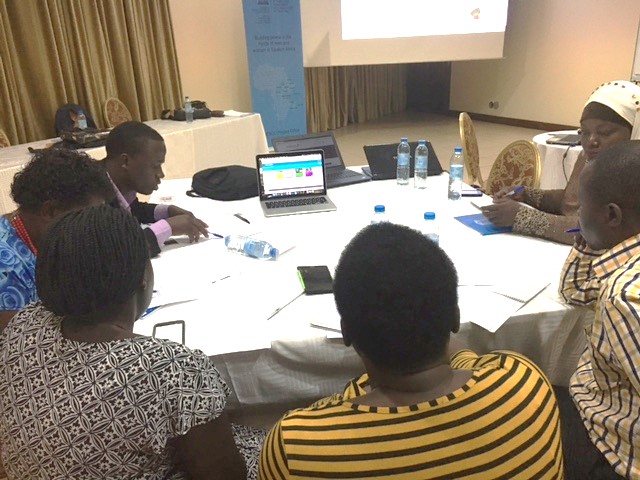-
-
Collaborative documents online
Free online services can be used in educational contexts to share documents with learners and colleagues. This course introduces Microsoft Office Live and Google docs and is suitable for practitioners working in Primary and Secondary schools.
Course
7 hrs
-
Sharing ideas: introducing wikis
This course explores how to use wikis to support collaborative learning projects in Primary schools. It is a basic introduction to wikis. If you would like to understand more about, and how to add images, upload video and other media, our Sharing ideas: developing wikis (V01p) course will be more suitable.
Course
6 hrs
-
Sharing ideas: developing wikis
This space contains only the 'Library copy' of materials for the Course. The materials have been created or endorsed by the Vital Core Team and/or by the community. When you sign up for a Vital Course, you will have more than the materials … you will join a cohort of fellow students with online support from a Vital Facilitator over a period of time. On many of our courses, there is also a two-hour face-to-face session to get everyone started.
Course
20 hrs
-
Learning together: introducing wikis
This course explores how to use wikis to support collaborative learning projects in Secondary schools. It is a basic introduction to wikis. If you would like to understand more about, and how to add images, upload video and other media, our Learning together: developing wikis (V01s) course will be more suitable.
Course
6 hrs
-
Learning together: developing wikis
When used properly, wikis are powerful tools that enable sharing of information and knowledge. This Secondary course explores how they can be used in the classroom to improve teaching and learning and enable collaboration on group projects. You will either use a wiki on your school’s learning platform or, if this is not available to you, we will explain how to sign up to use one of the free online wiki services.
Course
20 hrs
-
Tap into Twitter
Twitter can be used personally, professionally and in teaching practice. Participants will be shown how to register for a Twitter account, and how to find and follow other interesting users. This course introduces Twitter and is suitable for practitioners working in Primary and Secondary schools.
Course
5 hrs
-
Learning platforms: all aboard
Installing a learning platform or VLE is as much about changing culture and processes as it is about new technology. This course will help Secondary senior leaders get more value from their learning platform, by understanding how it can benefit their school and by giving them time to successfully implement it.
Course
20 hrs
-
Learning platforms: a step up
Installing a learning platform or VLE is as much about changing culture and processes as it is about new technology. This course will help Primary senior leaders get more value from their learning platform, by understanding how it can benefit their school and giving them the tools to successfully implement it.
Course
20 hrs
-
Wow them with Wikipedia
Wikipedia is the largest encyclopedia in the world and an invaluable learning resource. This course, suited to Primary or Secondary practitioners, explores how to create and maintain pages, and how learners can use the site to add value to their own work and collaborative projects.
Course
9 hrs
-
Copyright: keep it legal
This course looks at how to find digital resources that you can legally use in your work, including any related copyright issues. It is suitable for practitioners working in Primary and Secondary schools.
Course
10 hrs
-
Working with multimedia
In this unit of the Diploma, learners develop an understanding of contemporary digital media and how it applies to communication and entertainment. This Secondary course will show you how to use the e-skills teaching and learning resources for this course to deliver the module in 60 teaching hours.
Course
8 hrs
-
Multimedia skills and application
This course explores the stages in the development of a multimedia product from client brief to final delivery. It is relevant to all IT and ICT courses at Key Stages 4 and 5 that include website and web page creation, and use of multimedia.
Course
10 hrs
-
Exploring organisations
In this unit of the Diploma learners develop an understanding of how organisations operate. This Secondary course will show you how to use the associated e-skills teaching and learning resources to help improve understanding and will give ideas and advice on how to engage employers with the Diploma.
Course
8 hrs
-
The potential of technology
In this unit of the Diploma learners will explore the potential of technology in a business context. This Secondary course, which focuses on how technology is used as part of the John Lewis retail lifecycle, demonstrates how to use the e-skills resources to deliver the unit.
Course
7 hrs
-
Teaching ICT KS1
This course is designed to support you in carrying out a project in KS1 in an aspect of teaching ICT. It is supported by a range of resources and activities to provide ideas and stimuli for the project. You will plan, carry out and reflect on the project with the guidance of a facilitator and in discussion with others.
Course
12 hrs
-
Teaching ICT KS2
This course is designed to support you in carrying out a project in KS2 in an aspect of teaching ICT. It is supported by a range of resources and activities to provide ideas and stimuli for the project. You will plan, carry out and reflect on the project with the guidance of a facilitator and in discussion with others.
Course
12 hrs
-
Teaching ICT KS3
This course is designed to support you in carrying out a project in KS3 in an aspect of teaching ICT. It is supported by a range of resources and activities to provide ideas and stimuli for the project. You will plan, carry out and reflect on the project with the guidance of a facilitator and in discussion with others.
Course
12 hrs
-
Assessing ICT KS1
This course is designed to support you in carrying out a project in KS1 in an aspect of assessing ICT. It is supported by a range of resources and activities to provide ideas and stimuli for the project. You will plan, carry out and reflect on the project with the guidance of a facilitator and in discussion with others.
Course
12 hrs
-
Assessing ICT KS2
This course is designed to support you in carrying out a project in KS2 in an aspect of assessing ICT. It is supported by a range of resources and activities to provide ideas and stimuli for the project. You will plan, carry out and reflect on the project with the guidance of a facilitator and in discussion with others.
Course
12 hrs
-
Assessing ICT KS3
This course is designed to support you in carrying out a project in KS3 in an aspect of assessing ICT. It is supported by a range of resources and activities to provide ideas and stimuli for the project. You will plan, carry out and reflect on the project with the guidance of a facilitator and in discussion with others.
Course
12 hrs
-
E-safety KS1
This course is designed to support you in carrying out a project in KS1 in an aspect of e-safety. It is supported by a range of resources and activities to provide ideas and stimuli for the project. You will plan, carry out and reflect on the project with the guidance of a facilitator and in discussion with others.
Course
12 hrs
-
E-safety KS2
This course is designed to support you in carrying out a project in KS2 in an aspect of e-safety. It is supported by a range of resources and activities to provide ideas and stimuli for the project. You will plan, carry out and reflect on the project with the guidance of a facilitator and in discussion with others.
Course
12 hrs
-
E-safety KS3
This course is designed to support you in carrying out a project in KS3 in an aspect of e-safety. It is supported by a range of resources and activities to provide ideas and stimuli for the project. You will plan, carry out and reflect on the project with the guidance of a facilitator and in discussion with others.
Course
12 hrs
-
E-safety KS4
This course is designed to support you in carrying out a project in KS4 in an aspect of e-safety. It is supported by a range of resources and activities to provide ideas and stimuli for the project. You will plan, carry out and reflect on the project with the guidance of a facilitator and in discussion with others.
Course
12 hrs
-
Project management in the IT industry
This course introduces the principles of project management, including an explanation of the project lifecycle and the tools and techniques used by IT project managers in business and industry. It is relevant to all IT and ICT courses at Key Stage 4 and 5 that include project management.
Course
10 hrs
-
Website development skills and application
This course explores the stages in the development of websites from client brief to final delivery. It is relevant to all IT and ICT courses at Key Stages 4 and 5 that include website and web page creation, and use of multimedia.
Course
10 hrs
-
Writing using multimodal approaches KS1
This course has been produced in conjunction with UKLA. It is designed to support you in carrying out a project in KS1 in an aspect of writing using multimodal approaches. It is supported by a range of resources and activities to provide ideas and stimuli for the project. You will plan, carry out and reflect on the project with the guidance of a facilitator and in discussion with others.
Course
12 hrs
-
Writing using multimodal approaches KS2
This course has been produced in conjunction with UKLA. It is designed to support you in carrying out a project in KS2 in an aspect of writing using multimodal approaches. It is supported by a range of resources and activities to provide ideas and stimuli for the project. You will plan, carry out and reflect on the project with the guidance of a facilitator and in discussion with others.
Course
12 hrs
-
Writing using multimodal approaches KS3
This course has been produced in conjunction with NATE. It is designed to support you in carrying out a project in KS3 in an aspect of writing using multimodal approaches. It is supported by a range of resources and activities to provide ideas and stimuli for the project. You will plan, carry out and reflect on the project with the guidance of a facilitator and in discussion with others.
Course
12 hrs
-
Introduction to games
This courses provides an introduction to games in the classroom. The course will focus on freely available online games, which can provide a starting point for exploring their use in the classroom without investment in hardware and software. At the conclusion of this course you will have developed a lesson plan ready for implementation in your classroom.
Course
7 hrs
-
Researching and evaluating a game for the classroom
This course looks at how aspects of learning may be supported and enhanced through the use of digital games. Computer, digital or video digital games are increasingly being incorporated into teaching and learning as educational resources. The focus of this course is a project that you will carry out in your teaching and learning setting.
Course
10 hrs
-
Using games to develop literacy KS2
This course has been produced in conjunction with the Redbridge Games Network. It is designed to support you in carrying out a project in KS2 in an aspect of using computer-based games to develop literacy. It is supported by a range of resources and activities to provide ideas and stimuli for the project. You will plan, carry out and reflect on the project with the guidance of a facilitator and in discussion with others.
Course
12 hrs
-
Using games to develop numeracy KS2
This course has been produced in conjunction with the Redbridge Games Network. It is designed to support you in carrying out a project in KS2 in an aspect of using computer-based games to develop numeracy. It is supported by a range of resources and activities to provide ideas and stimuli for the project. You will plan, carry out and reflect on the project with the guidance of a facilitator and in discussion with others.
Course
12 hrs
-
Making games, motivating learners KS2
This course has been produced in conjunction with 2Simple and the Redbridge Games Network. is designed to support you in carrying out a project in KS2 in an aspect of motivating learners through the making of computer-based games across the curriculum. It is supported by a range of resources and activities to provide ideas and stimuli for the project. You will plan, carry out and reflect on the project with the guidance of a facilitator and in discussion with others.
Course
12 hrs
-
Using the game Spore to motivate learners KS3
On this secondary course, you will look at how games can be motivational and see particular examples of where the game Spore has been used to motivate learners. The course builds on Futurelab’s research into the use of games. It will support you in developing your professional understanding and your practical teaching, and improving your learners’ outcomes.
Course
12 hrs
-
-
-
TESS-India: All India Resources (in English)
The TESS-India Open Educational Resources (OER) comprise 105 units aimed at pre- and in-service elementary and secondary school teachers (Teacher Development OER), and 20 units for school leaders (School Leadership OER). The OER are available in multiple versions for use in a range of linguistic and cultural contexts. Here you will find the English language versions.The key principles of practice that underpin the participatory pedagogy of the TESS-India OER are detailed in ten Key Resources. The video resources complement the OER and show teachers using the principles of practice in a range of authentic Indian classrooms.
Material
10 hrs
-
TESS-India: के हिंदी संसाधन (All India Resources in Hindi)
The TESS-India Open Educational Resources (OER) comprise 105 units aimed at pre- and in-service elementary and secondary school teachers (Teacher Development OER), and 20 units for school leaders (School Leadership OER). The OER are available in multiple versions for use in a range of linguistic and cultural contexts. Here you will find the Hindi language versions.The key principles of practice that underpin the participatory pedagogy of the TESS-India OER are detailed in ten Key Resources. The video resources complement the OER and show teachers using the principles of practice in a range of authentic Indian classrooms.
Material
10 hrs
-
TESS-India: Assam Resources (in Assamese)
The TESS-India Open Educational Resources (OER) comprise 105 units for classroom teachers in elementary and secondary schools (Teacher Development OER), and 20 units for school leaders (School Leadership OER). The OER are available in multiple versions for use in a range of linguistic and cultural contexts.
Material
10 hrs
-
TESS-India: Bihar Resources (in Hindi)
The TESS-India Open Educational Resources (OER) comprise 105 units for classroom teachers in elementary and secondary schools (Teacher Development OER), and 20 units for school leaders (School Leadership OER). The OER are available in multiple versions for use in a range of linguistic and cultural contexts.
Material
10 hrs
-
TESS-India: Karnataka Resources (in Kannada)
The TESS-India Open Educational Resources (OER) comprise 105 units for classroom teachers in elementary and secondary schools (Teacher Development OER), and 20 units for school leaders (School Leadership OER). The OER are available in multiple versions for use in a range of linguistic and cultural contexts.
Material
10 hrs
-
TESS-India: Madhya Pradesh Resources (in Hindi)
The TESS-India Open Educational Resources (OER) comprise 105 units for classroom teachers in elementary and secondary schools (Teacher Development OER), and 20 units for school leaders (School Leadership OER). The OER are available in multiple versions for use in a range of linguistic and cultural contexts.
Material
10 hrs
-
TESS-India: Odisha Resources (in Odia)
The TESS-India Open Educational Resources (OER) comprise 105 units for classroom teachers in elementary and secondary schools (Teacher Development OER), and 20 units for school leaders (School Leadership OER). The OER are available in multiple versions for use in a range of linguistic and cultural contexts.
Material
10 hrs
-
TESS-India: Uttar Pradesh Resources (in Hindi)
The TESS-India Open Educational Resources (OER) comprise 105 units for classroom teachers in elementary and secondary schools (Teacher Development OER), and 20 units for school leaders (School Leadership OER). The OER are available in multiple versions for use in a range of linguistic and cultural contexts
Material
10 hrs
-
TESS-India: West Bengal Resources (in Bengali)
The TESS-India Open Educational Resources (OER) comprise 105 units for classroom teachers in elementary and secondary schools (Teacher Development OER), and 20 units for school leaders (School Leadership OER). The OER are available in multiple versions for use in a range of linguistic and cultural contexts.
Material
10 hrs
-
TESS-India: Enhancing teacher education through OER MOOC
This is a six-week, task-oriented MOOC that focuses on how to select, evaluate and use Open Educational Resources (OER) to help support quality in teacher education. Teacher development is a highly complex process and there are many different ideas about the best way to prepare and support quality teachers.This MOOC was designed for teacher educators and was successfully run as an online course on another platform. It is now on OpenLearn Create so that you can work through the material at your own pace. You may be working in a university, teachers’ college, local resource centre or other teacher-education setting, or as a Headteacher or other senior member of staff supporting the teachers in your school. Whatever your circumstance, we hope that you will all find ideas and OER that you can use with teachers to improve classroom teaching and learning processes. This MOOC is also in Hindi as an archived course here: https://www.edx.org/course/enhancing-teacher-education-through-oer-Hindi-oecx-tess101x
Course
30 hrs
-
-
-
Inclusive Teaching and Learning
This course focuses on what it means to be an inclusive teacher. The underlying assumption is that all teachers have a responsibility to develop and use inclusive practices. This will benefit all leaners, including those with a specific need.
Course
16 hrs
-
My OpenLearn Create Profile
- Personalise your OpenLearn profile
- Save Your favourite content
- Get recognition for your learning
Already Registered?
